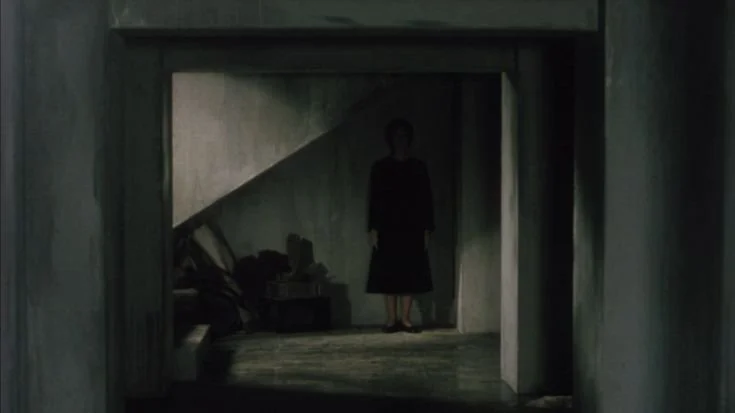Ghost Hunter
An old couple entered the cinema, carrying a Victorian porcelain doll with a painted half-smile; outstretched arms, fingers pointing up to the sky. They placed her beneath the projection, with flashing lights on either side of her white mary janes.
They were paranormal investigators, speaking before the screening of Pulse (2001), a Japanese ghost movie which neither had seen. The husband was a medium, and the wife was a clairvoyant empath. They frequented haunted sites, trying to detect ghosts with cameras, voice recorders, and infrared sensors. The doll was named Clare; she was possessed by the spirit of a girl who had died young and violently. She communicated with them via blinking battery lights. As the couple sat down, they left Clare to glow softly beneath the screen.
Pulse is about ghosts breaking into the physical world through the internet. The dead fade into black stains on the walls and reappear as glitches, haunting the living with endless loops of images on computer monitors.
After the movie, the couple lingered. The man spoke about seeing his dead brother on the couch after returning home from his funeral. He thought he was going crazy.
His brother said, “we have a lot of work to do”. Ghosts had followed him ever since.
I asked, “do you see ghosts in your dreams?”
“All the time”, he said.
He offered me Clare and I held her like a real baby. He smiled a big, toothless grin, and kept saying,
“We do it all for love”.
If you try hard enough, you can think a ghost into being. Imagine a figure by the window in dusty light. See a woman sitting on her front porch as you drive by. A whole life drifts before you in a passing glance. You know her. You can see into her. When the car moves past the house, you can understand that she was not a seated woman, but a straw hat laying discarded atop a paint can. Know that she was real anyway. A silver fish will slip from your hands the moment you try to grab a hold of its tail.
Imagination blisters reality. With no references or associations, your reality expands to fill the day. This is freedom. Your consciousness dilates with practice. When you don’t know what to do, look for signs. Signs are miracles, appearing when you least expect them. Death liberates suppressed material. It gets us closer to the things we haven’t discovered about ourselves yet. When we die, the first we’ll say is,
“I’ve been here before”.
Chris Kraus says the living can absorb the dead at any time, and therefore, our species has an infinite capacity for memory. [1] Time is mixed with blood. These ideas draw on those of Philip K Dick under the influence of amphetamines in Valis (1981), where he claimed that the Gnostic empire never ended. He said that at death, the spirit transforms itself into a code that travels back into the world as information. [2]
You are made of time. It is the force that tells you who you are. Time is supposed to pass, but ghosts lack the ability to reconcile with this condition. Their present and futures are simultaneous. Ghosts fall from their experience of an objective world to the depths of infinite space–time, where they do not feel a sense of moving forward.
Like the ghost lemurs of Madagascar, their way of thinking is not oriented toward time, sequence and causality. [3] If there is no time sequence except for what we conceive of, to make us at peace with the world, then it is possible to cross from one nameless state to another. Perhaps a gateway must be created between here and there.
The ghosts from Pulse use the internet as a conduit to make contact with the living, trapping them in a digital limbo. They can’t escape that liminal space, so they try to bring the living with them. Ghost hunting, like a belief in aliens, is a way of looking outside the self. It is an attempt to escape the imprisonment of the body; the alienation of being human.
“We do it all for love,” he said.
Communing with ghosts is a display of radical empathy, a oneness with everything. “By an extreme effort of concentration, you might be able to escape your flesh, to rise above and discover the true meaning of divine love,” says Kraus. [4] Empathy is a loop. In this state, there is no separation between who you are and what you see.
I’m in my bedroom, smoking a cigarette out the window. I can see a ghost across the alley with long black hair. I don’t trust my eyes at first, thinking it must be a distortion made by raindrops on the window, a peripheral daydream. But the feeling, unlike anything I’ve felt before, makes it real. I start to record what I see in my notebook. I expect the vision to fade away as I replace it with words, but when I look away and back again, she’s still there. I know it’s all in my mind, but I’m looking at it with open eyes. When I let go of my fear, angels appear. A flower morphs into hands cupping dirt.
A woman lies on her back, head in the water of a flowing stream.
[1] Kraus, Chris. Aliens and Anorexia. MIT Press, 2000.
[2] Dick, Phillip K. Valis. Bantam Books, 1981.
[3] Burroughs, William. Ghost Lemurs of Madagascar. Omni Publications International Ltd., 1987.
[4] Kraus, Chris. Aliens and Anorexia. MIT Press, 2000.

